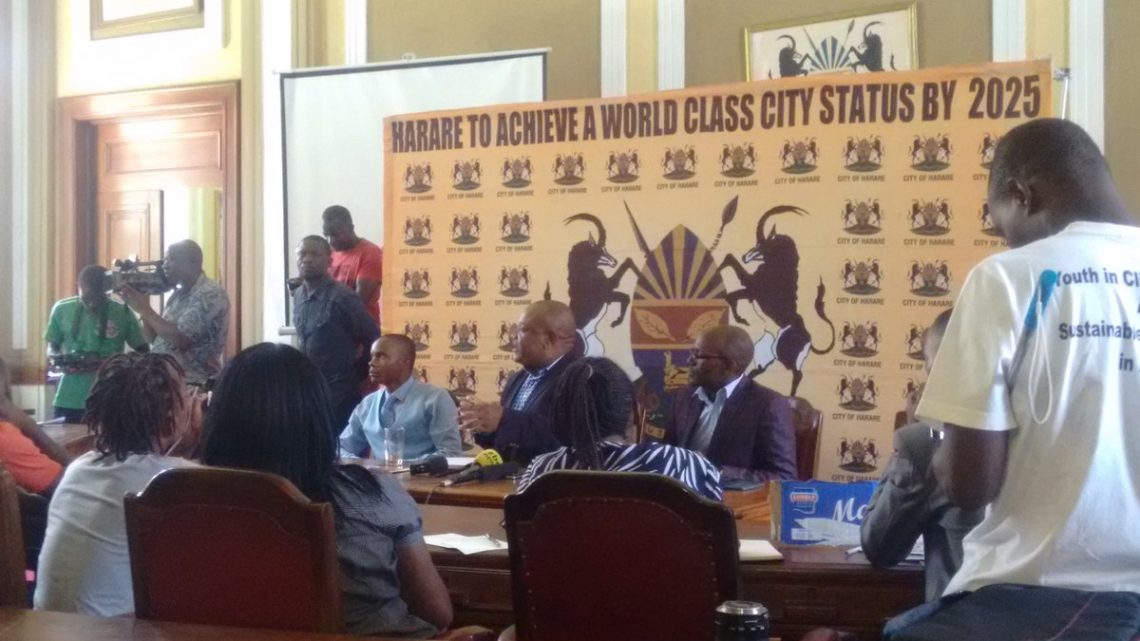By Byron Mutingwende
Harare Municipality is facing a myriad of challenges but Mayor Bernard Manyenyeni has put the blame squarely on executive interference and gross mismanagement for the shoddy service delivery.
Speaking during a stakeholder engagement meeting at in Harare on Friday 29 December 2017, Manyenyeni highlighted that the city had no ultimate authority on decision making since the city had gone for more than 30 months without a substantive Town Clerk. That was after the appointment of James Mushore was reversed following interference from the parent ministry.
“I am encouraged by the new brooms at the ministry, both the minister July Moyo and his permanent secretary, Mr. George Magosvongwe. We are banking on their perceived professionalism to allow us to conclude this overdue matter. This town clerk matter is critical to for the current and next Mayor because our residents do not know or care about a Mayor being non-executive. They just want things done,” Manyenyeni said.
To illustrate the gross mismanagement, manpower costs chew the bulk of Harare City’s revenue, particularly the executive remuneration and benefits.
“What seems easiest to appreciate are the executive costs. Let it be shared that the executive costs are only 3% of the total costs. I will shortly demonstrate first that the costs are unsustainable and secondly that even the lower level costs are 2 to 5 times the costs carried by other employers for similar jobs.”
The following statistics were revealed. A municipal guard or patrolman costs the City $1, 057 per month while a ZRP officer costs just over $400 per month, which is 2, 5 times more. A council nursing sister costs the City $1, 527 while a government nursing-sister just over $500. That is more than 3 times more. These costs amount to nearly $10 million coming from $12 million to $13 million collected.
Manyenyeni revealed that the council has obligations for overdue amounts, which must be serviced at $6 million a month and electricity costs of $1, 2 million per month. The Mayor said the political will to fix the problem has been missing because the two political parties represented in council have strong labour backing.
Harare water has had perennial challenges in terms of coverage or distribution. However, over the last three years, council has increased supply from 400ML per day to over 500ML per day. This has been largely due to the refurbishment of the Morton Jeffrey Waterworks at Lake Chivero. The plant is 60 years old and was designed to cater for a city population of 300,000 but is now serving 4 million people, the Mayor disclosed.
It emerged that the capacity challenges faced in 2017 were results of expansion not done since the 1980s. The city needs seven chemicals to purify the water while other municipalities just require two. The main chemicals used in water purification include aluminium sulphate, sulphuric acid, HTH chlorine and activated carbon.
Hardlife Mudzingwa, the Programme Manager of Community Water Alliance said it was high time Harare Water was declared a national disaster.
“My own analysis on water provision in Harare points to the urgent need to proffer a short term solution. Cde Lovemore Dhobha if you can engage Unicef Zimbabwe to assist in water treatment tablets so that purification at point of use is practiced, the better. This should be a priority at Urban Rehab meetings or should force an urgent meeting. If you need facilitation of a meeting between Harare Water Director and you guys, I am available to serve people in Harare.
Outside this short term intervention, there is need to fundraise for rehabilitation of Crowborough sewer treatment plant, Firle and that one from Chitungwiza to address raw water quality in Marimba river, Mukuvisi river and Manyame respectively.
“Above this Harare need urgent institutional changes. There is need to address transparency issues on administration of funds, address the wage bill and change the work culture. Tenderpreneurship must stop. Governance issues are fundamental. Local Government Ministry must allow devolution to take place and give autonomy to the Local Authority so that it fully accounts without excuses. An Executive Mayor for big cities is a must,” Mudzingwa said.
Linda Masarira, a Harare Central aspiring Member of the House of Assembly blamed the councilors from the main opposition MDC party for misplaced priorities in mismanaging water.
“The MDCT has failed to exhibit values and principles of development and accountability as the main opposition party in Zimbabwe. The City of Harare spends at least $2 million on a football team yet fundamental human rights like water are not met. Let’s face reality and map the way forward,” Masarira said.
